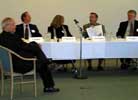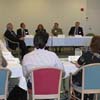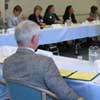Events
SOCCIS Campus Visits
The SOCCIS Steering Committee meetings constitute a series of networking and informational sessions hosted by a SOCCIS member institution. Host institutions, both private and public, have the opportunity to profile their campus international activities and to focus on international programs of major importance. The host institution is also able to bring together various campus administrators to discuss their areas of responsibility and how they see the future of international education at their institution. SOCCIS Steering Committee members can compare and contrast activities at the host institution with the international programs and activities at other institutions.
Campus Visit Agendas and Campus Programs planned for:
- California State University, Fullerton – May 10, 2002
- Whittier College – May 11, 2001
- California State Polytechnic, Pomona – May 5, 2000
- University of California, San Diego – April 9, 1999
- California State University, Long Beach – May 13, 1998
Rotating Campus Visits List 1998-2009
October 9, 2009
Loyola Marymount University
March 27, 2009
University of San Diego
October 23, 2008
University of California, Los Angeles
May 2, 2008
University of California, Santa Barbara
October 5, 2007
Loyola Marymount University
April 13, 2007
California State Polytechnic University, Pomona
September 29, 2006
Loyola Marymount University
April 21, 2006
Pepperdine University
September 23, 2005
Loyola Marymount University
April 22, 2005
California State University, Northridge
October 22, 2004
Loyola Marymount University
April 16, 2004
California State University, San Bernardino
September 25, 2003
Loyola Marymount University
Friday, May 9, 2003
Loyola Marymount University
May 10, 2002
California State University, Fullerton
May 11, 2001
Whittier College
May 5, 2000
California State Polytechnic, Pomona
April 9, 1999
University of San Diego
With the participation of San Diego State University and the University of California, San Diego
May 13, 1998
California State University, Long Beach
SPRING 2001-2002 SOCCIS
STEERING COMMITTEE MEETING
MAY 10, 2002
CALIFORNIA STATE UNIVERSITY, FULLERTON
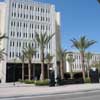 |
|
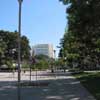 |
|
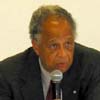 |
Welcome Remarks President Milton A. Gordon |
Panel - Internationalization at CSU Fullerton
Models of Inter-institutional Cooperation
Challenges and Opportunities since September 11
Special Reports
International Student Issues and Study Abroad/Exchange Programs
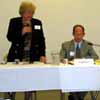
|
Dr. Linda Andersen, Professor and Program
Coordinator, CSUF
Mr. Bob Ericksen, Director, International Education and Exchange |
SOCCIS Business Session
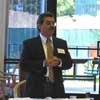
|
Dr. Carlos Haro SOCCIS Executive Officer and Assistant Dean International Studies and Overseas Programs University of California, Los Angeles |
A Post 9/11 Perspective on International Education
Bob Ericksen,
Director, International Education and Exchange,
California State University, Fullerton
(714) 278-2787
bericksen@fullerton.edu
SOCCIS meeting, May 10, 2002
There are three primary challenges to me as an administrator of a comprehensive
international office which serves international students as well as study
abroad students.
· In light of the imminent foreign student "tracking"
system implementation, how do we continue to provide excellent services
to our 1500 international students without compromising our role as educators
and student advocates? In a time of limited resources, how can we afford
to devote so much to the implementation of "SEVIS" (Student
and Exchange Visitor Information System)?
· How can we get a critical mass of students to study abroad? What
are effective strategies to increase our disappointing numbers? Does 9/11
give us an opportunity to market study abroad more effectively?
· How can we facilitate- and encourage- increased international
activity at the university while, at the same time, paying increased attention
to liability issues and legal/immigration issues? Can we be appropriately
attentive to these matters and not discourage faculty/university international
initiatives?
It is a time of some discouragement. The Federal agencies which oversee various aspects of international exchange, U.S. INS and the U.S. Department of State, face overwhelming challenges in reform to effectively monitor students' presence in the U.S.(for INS) and for screening visa applicants (for Dept. of State). School officials have little confidence that the implementation of the SEVIS tracking system will be smooth or effective. Yet, we are reluctant to speak openly about this, for fear of being portrayed as unpatriotic or unsupportive of the "war on terrorism".
Implementation of SEVIS will be very costly for college and university administrations who take these responsibilities seriously. Institutions with limited resources may find themselves forced out of the "business" of admitting international students. Hopefully, the INS' recertification process will result in the elimination of bogus institutions offering programs for international students.
Institutions and professional associations have occasionally been unfairly portrayed in the media as resistant to any efforts to maintain international student information in an electronic format. Media attention to international students has focused on visa violators, blurring the distinction between a visa violation and involvement with terrorism. This seems to feed the politicians' eagerness to restrict international students, who actually comprise less than 2% of non-immigrant visa-holders in the U.S. The role of international education as a positive component of the "solution" to terrorism has been largely ignored.
Higher education professional associations (NAFSA: Assn. Of International Educators, AASCU-American Assn. Of State Colleges and Universities, ACE-American Council on Education, AACRAO-American Assn. Of Collegiate Registrars and Admissions Officers, etc.) have collaborated as never before to present a unified position on the SEVIS program and to minimize the impact on the educational process. With the SEVIS debate behind us, we have an opportunity for the associations to collaborate in building a national policy on international education.
Interest in study abroad appears undiminished. In fact, there appears to be increased interest in some areas. The post 9/11 revelations about the dismal state of U.S. Americans' knowledge of other languages provides dramatic evidence of the need for unified national support for growth of area studies, foreign language education, and increased aid for study abroad.
International students have been hit with many strong emotions; feeling blamed, feeling they cannot express their feelings honestly, and feeling confused by the mixed messages and struggles they are witnessing in U.S society. International Student offices like ours are struggling to give our students the knowledge, skills, and resources to sort out the complexities of these issues.
On a personal level, to know that even one accused terrorist had been a student, I feel a loss of my faith that every international student would find something of value in our society to enrich his or her life and perspective. I feel we have been distracted from our real mission, to, instead, be spending an inordinate amount of time defending our programs and attending to legislative attacks on international education. I see students and institutions who do abuse the privileges given to them as participants in international education, and this deeply disappoints me. I also see countless serious and enthusiastic participants in international education, who, every day, remind me that we are engaged in the most exciting profession in the world. We have a new, and stronger voice on the campus and in the nation. I hope that this can bring us together as we build international education as an essential component, affirmed through policy and resources, for a more secure nation and world.
For my perspective on the ethical considerations of international educators in these challenging times as well as the views of other international educators, I encourage you to review the Winter 2002 issue of International Educator magazine, published by NAFSA: Assn. Of International Educators.
California State University Fullerton (CSUF)
www.fullerton.eduSpring 2002 Report to the CSUF International Education Committee
Keith Boyum
Associate Vice President, Academic Programs
March 27, 2002
I am pleased to provide an overview of campus international activity.
Please note that it is surely incomplete, and happily so, because there
is more globalization ongoing at our large institution than we can comprehensively
survey via usual channels. However, what follows is based on very helpful
reports from University Extended Education (including the American Language
Program), from most of the colleges, and from International Education
& Exchange. My thanks go to the deans and others who helped pull this
review together, and to Bob Ericksen for stimulating the effort to do
so. Each of our 7 colleges is represented in fresh initiatives to internationalize
our student and faculty experiences. While there is still - always - much
more to do, I think we can all take heart in this review.
As of Spring, 2002:
University Extended Education (UEE), through Dean Harry Norman, and its Coordinator of International Programs, Trankiem Luu, is facilitating CSUF involvement in learning via partnerships and contracts in Vietnam, in other southeast Asian nations [Singapore and others], in India via delivery of certificate programs, in China by partnering with CSUF colleges, and via certificate programs delivered in many locations. American Language Program offerings both in Fullerton and in a remarkable variety of locations abroad, have helped to extend even further the reach of this campus: with 202 students enrolled, a new record was set in Fall 2001.
The College of the Arts is embracing relationships with institutions abroad, including, for example, Dr. Vance Wolverton's (Music) relationships with conservatories in Baltic nations (Estonia; Latvia; Lithuania).
Recently Trinity College in Wales has been featured. Dr. Joan Melton (Theatre) has led in establishing warm relationships between the Theatre department at this small college and our own department of Theatre and Dance. Dr. Melton has paid professional visits to Trinity, and her efforts were reciprocated in part by a visit paid by the Head of the program at Trinity to CSU Fullerton in February. With the enthusiastic cooperation of faculty and administrators in the Department of Theatre and Dance and the College of the Arts, plans are being laid for two or three Trinity students to study at CSUF in Fall semesters, and an equal number of CSUF students to study at Trinity in Spring semesters.
The College of Business & Economics under Dean Anil Puri has enjoyed a broad and continuing association with Fachhochschule Nuertingen involving faculty and student exchanges. The college has many other international projects and involvements to report for its AACSB accreditation mandate for globalized faculty and student experiences. The delivery of the CSUF M.B.A. degree in Lima, Peru has been ongoing although some administrative issues have arisen recently.
The College of Communications under Dean Rick Pullen is preparing to deploy its M.A. in Communications in China beginning this calendar year. The School of Professional and Continuing Education (SPACE) of the University of Hong Kong will partner in this effort, providing recruitment and on-site administration. Communications faculty will spend a semester in China, splitting their time between Hong Kong and Shanghai. Upcoming shortly is a review by WASC, the final permission required for this bold venture. It is worth brief mention, at least, that the college also enjoys other international relationships, including with institutions and faculty in England and New Zealand.
The College of Engineering and Computer Science under Dean Raman Unnikrishnan is looking forward to its developing relationship with Fachhochschule Karlsruhe (Germany). In a recent report, the dean offered a long list of international professional involvements on the part of ECS faculty.
The College of Human Development & Community Service (HDCS) under Acting Dean Judith Ramirez is deepening relationships with the University of New England (Australia) among others. In this, we are pleased to build upon CSUF Chair of Counseling Dr. Jeffrey Kottler's relationships with faculty at the U. of N.E. Upon a recent visit to CSUF by a senior representative of the U. of N.E., CSUF faculty and HDCS administrative leaders discussed various plans for cooperation that may be appropriate for further development. Among these is possible participation of CSUF Counseling faculty in U. of N.E. programs delivered in locations abroad. Some of these may be at the doctoral level, and would feature distance education. Meanwhile, HDCS faculty are also preparing an application for a Fulbright-Hays Group Study Abroad faculty project while celebrating many individual faculty relationships with colleagues abroad.
The College of Humanities & Social Sciences under Dean Thomas Klammer continues its interest in Vietnam. With Dr. Dennis Berg on-site in Ho Chi Minh City for a second year (this year as a Fulbright Fellow), opportunities are being developed for new ways and means for cooperation with Vietnamese universities. The Foreign Languages and Literatures faculty continue to welcome each year an exchange professor from Fudan University (Shanghai, China), who is assigned to teach Chinese. HSS has expanded its consortial participation in the London Semester, offering the program now every semester rather than once annually. HSS has also announced a new Florence Semester, designed with goals very similar to the London Semester.
The College of Natural Sciences & Mathematics under Dean Kolf Jayaweera supports relationships in Thailand and England, encouraging faculty-led student study in a variety of venues. These include Chiang Mai University in north-western Thailand, which is among the institutions visited in January by a delegation led by Chemistry Professor Richard Deming, and which included President Gordon, HDCS Associate Dean Mickey Hollis, and Associate Vice President Keith Boyum. Still more recently, Dean Kolf Jayaweera and Dr. Michael Horn, Professor of Zoology, visited the Universidad del Pacifico in Ecuador.. We look forward to reciprocal student exchanges and research that may be able to focus upon very interesting environments, perhaps to include the Galapagos Islands. NSM faculty continue as well their interests in more than one institution in Mexico.
Administratively led by Academic Programs, university-wide delegations have been formed for the eleventh annual Fudan / Central University for Nationalities (in Shanghai/Beijing), China Faculty Seminar upcoming in June. For the first time, a second June delegation has also been formed, this one bound for Lithuania, there to be hosted by our partner, Kaunas University of Technology. The group will stop at three locations in Lithuania [a nation of three million which emerged from Soviet domination only in 1991, and which now seeks EU and NATO membership].
In a productive partnership with the Faculty Development Center and with the able leadership of Dr. Ed Trotter, a Mission & Goals initiative has resulted in a request for proposals from faculty for projects that would result in globalized student learning experiences. A required element of proposals is dollar support from college deans. Also, Dr. Linda Andersen, Professor of French, the CSUF representative on the Steering Committee for the Southern California Consortium for International Studies (SOCCIS) is leading preparations for CSUF to host SOCCIS' spring Campus Visit on May 10th.
The January 2002 Academic Affairs Forum featuring issues of internationalizing students, faculty and curriculum and globalization in general was well-attended. The audience appreciated remarks from John Hudzik, Dean of International Programs at Michigan State, and Carlos Cortes, emeritus Professor of History, U.C. Riverside.
As of March 2002, the Academic Senate is debating whether to require second language competency as a condition for graduation at CSUF. Probably this requirement would be waived for students in high-unit programs, and discussions are ongoing as to how to "count" heritage language proficiency that may be limited largely to oral and listening skills. President Gordon has declared his support in general terms for such an exit requirement, and the proposal arises at a time of record high demand for admission to CSUF [and apparently even higher demand for admission to CSU Long Beach and to San Diego State], which greatly lessens some concerns that by adding a new requirement for the bachelor's degree we would lose students to nearby CSU campuses.
Several proposals forwarded in this year's round of requests for President Gordon's Mission & Goals Initiatives were based on international themes and topics.
SPRING 2000-2001 SOCCIS STEERING COMMITTEE MEETING
MAY 11, 2001
WHITTIER COLLEGE
Welcome Remarks
David J. Muller, Vice President for Academic Affairs and Dean of Faculty
Comments by Carlos Manuel Haro, SOCCIS Executive Director
Introduction of Campus Institutional Representatives
Panel Topic - Internationalizing Across the Curriculum
"How a Small Liberal Arts College 'Internationalizes' Across the Curriculum: Whittier College, A Case Study"
Moderator: Joyce Kaufman, Associate Academic Dean and Director, Scholars Program
Faculty Panel:
Les Howard, Professor of Sociology
Mike McBride, Professor of Political Science and Director of
Foreign Study
Paul Kjellberg, Associate Professor of Philosophy and Director of
Asian Studies
Doreen O'Connor-Gomez, Associate Professor of Spanish and
Director of International Studies
Marie-Magdeleine Chirol, Associate Professor of French
SPRING 1999-2000 SOCCIS STEERING COMMITTEE MEETING
MAY 5, 2000
CALIFORNIA STATE POLYTECHNIC, POMONA
California State Polytechnic Pomona Program
Welcoming Remarks
Dr. Marvin Klein, Acting Vice President for Academic Affairs
Comments by Dr. Carlos M. Haro, SOCCIS Executive Officer
Introductions by Campuses Institutional Representatives
Panel Topics: campus overview: demographics, new construction, organization
of international programming, e.g. International Center, College of the
Extended University, English Language Institute, ESL courses, colleges,
admissions, etc.; curricular initiatives, such as Council for International
Education Exchange, study abroad, faculty grants, and integration into
curriculum
Panel Moderator: Dr. Jean Aigner, Director, International Center
Dr. Eric McLaughlin, Director, Graduate Programs, College of Business
Administration (CBA)
Topic: overseas MBA programs and international involvement
Dr. Barbara Way, Dean, College of Letters, Arts, and Social Sciences
(CLASS)
Topics: CLASS involvement in study abroad programs, including China and
London, Cuba programming and collaboration
Dr. David Fite, Interim Director, Faculty Center for Professional Development
Topics: Research Forum, summer seminars and collaboration
Panel Topics: Institutional responses to internationalization, including
surveys conducted by the International Center, campus climate, and WASC
Panel Moderator: Dr. Jean Aigner, Director, International Center
Steve Frieze, Interim Director, Institutional Research and Planning
Topic: International Center surveys and results
Donna Albro, Executive Director, Diversity and Compliance Programs
Topic: campus climate
Dr. D.D. Wills, WASC Coordinator, Academic Programs
Topic: WASC and internationalization
Visit the International Center
Panel Topics: International Center programs and initiatives, introduction
of staff
Panel Moderator: Dr. Jean Aigner, Director, International Center
Ying Cao, International Recruitment/ Study Abroad, International Center
Topics: recruiting, recruiting scholarships and funding
Judy Mitchell, International Student Advisor, International Center
Topics: international student programs, merit scholarships
Dr. Jean Aigner, Director, International Center
Topic: lottery scholarships for study abroad
Doug Glaeser, Program Development Coordinator, International Center
Topics: training projects, linkage grants
SPRING 1998-99 SOCCIS STEERING COMMITTEE MEETING
APRIL 9, 1999
UNIVERSITY OF SAN DIEGO
WITH THE PARTICIPATION OF SAN DIEGO STATE UNIVERSITY AND THE UNIVERSITY
OF CALIFORNIA, SAN DIEGO
Theme: Globalization of the Curriculum in the New Millennium
Welcome - Dr. Francis Lazarus, Academic Vice-President and Provost at USD
Panel -University of San Diego's International Vision
Moderator: Sister Maureen Cronin, Associate Provost
Panelists: Dr. Patrick Drinan, Dean of Arts and Sciences
Dr. Kenneth Serbin, History Department
Dr. Ellen Cook, School of Business
Dr. Jorge Vargas, Law School
Lunch Manchester Conference Center
Comments by Sister Maureen Cronin, Associate Provost USD and
Dr. Carlos M. Haro, SOCCIS Executive Officer
Presentations - San Diego State University
Dr. Alan Sweedler, Assistant Vice-President for International Programs
Dr. Hugo Murrillo, Professor of History
Ms. Lynn Garcia, Administrative Assistant in International Programs
Presentation - University of California, San Diego
Presentation by Dr. Ann Craig, Provost of Eleanor Roosevelt College University of California, San Diego
SPRING 1997-1998 SOCCIS STEERING COMMITTEE MEETING
MAY 13, 1998
CALIFORNIA STATE UNIVERSITY, LONG BEACH
I. Introductions and SOCCIS Welcome
Dr. John N. Hawkins, Dean
International Studies and Overseas Programs
University of California, Los Angeles
International Education at California State University, Long Beach - An Overview
II. Welcome to CSULB
Dr. Marilyn Jensen, Associate Vice President
Academic Affairs
III. Deans Presentations
Dr. Dorothy Abrahamse, College of Liberal Arts
Dr. Don Lauda, College of Health & Human Services
IV. Faculty Panel
Dr. Clorinda Donato, Chair, Romance, German, and Russian Languages and
Literatures
Dr. John Tsuchida, Chair, Asian, and Asian American Studies
Dr. Ben Wisner, Director, International Studies
V. Tour of CSULB Campus.
VI. Lunch in Chartroom (Pacific Room)
VII. Presentation on Center for
International Education
Paul M. Lewis, Director
Robert Prather, Asst. Dir./International Admissions
Grace Winchell, Asst. Dir/Intl. Student Services
VIII. University College and Extension Services
Dr. Marilyn Crego, Associate Dean, UCES
Dr. Debra Jonas, Director, American Language
Institute
IX. International Education Committee
Dr. Elaine Haglund, Professor, Social Foundations
Of Education, and Co-Chair, International Education
Committee
X. SOCCIS Business Session
Dr. Carlos Haro, Assistant Dean
International Studies and Overseas Programs
University of California, Los Angeles
